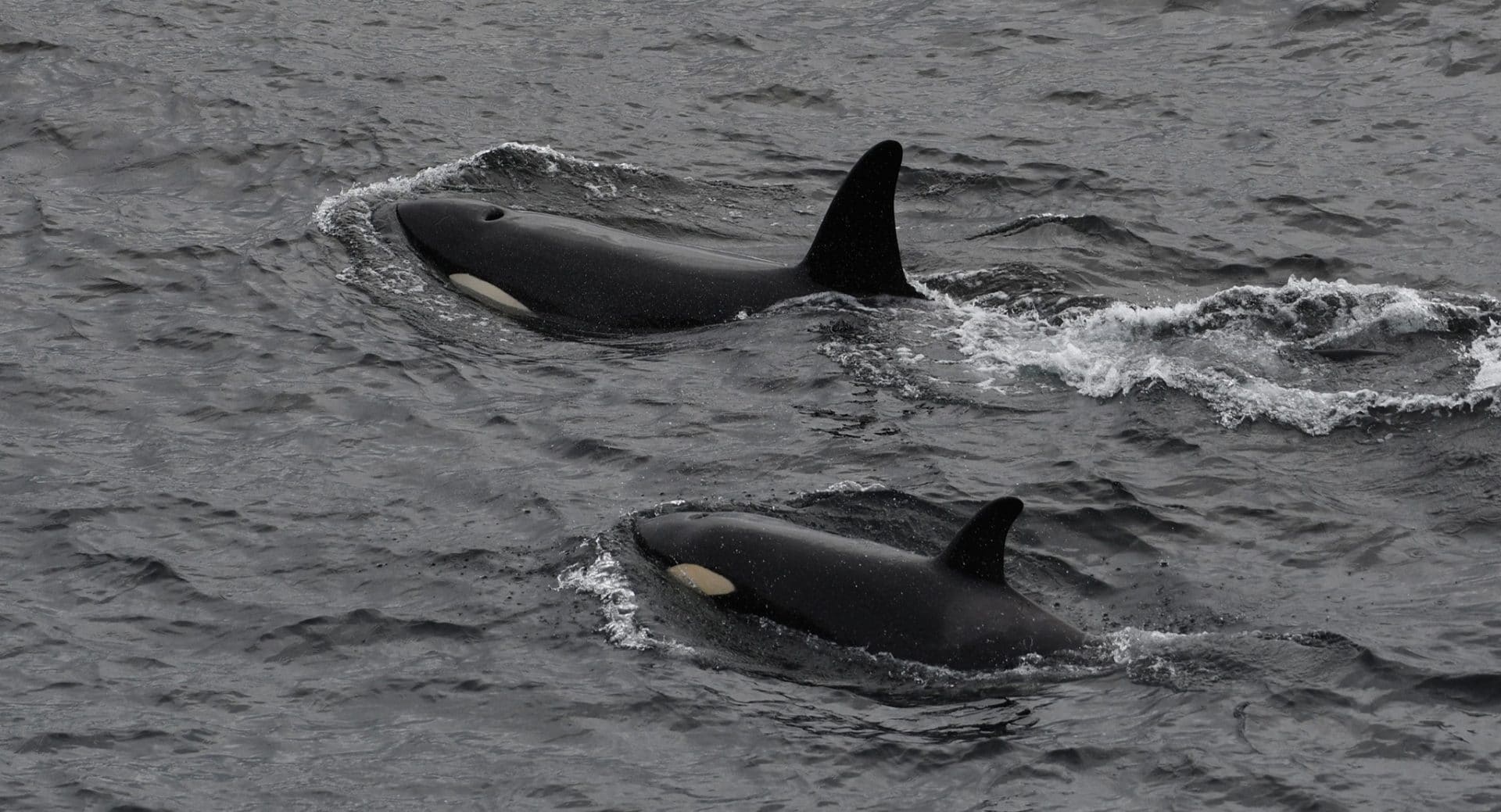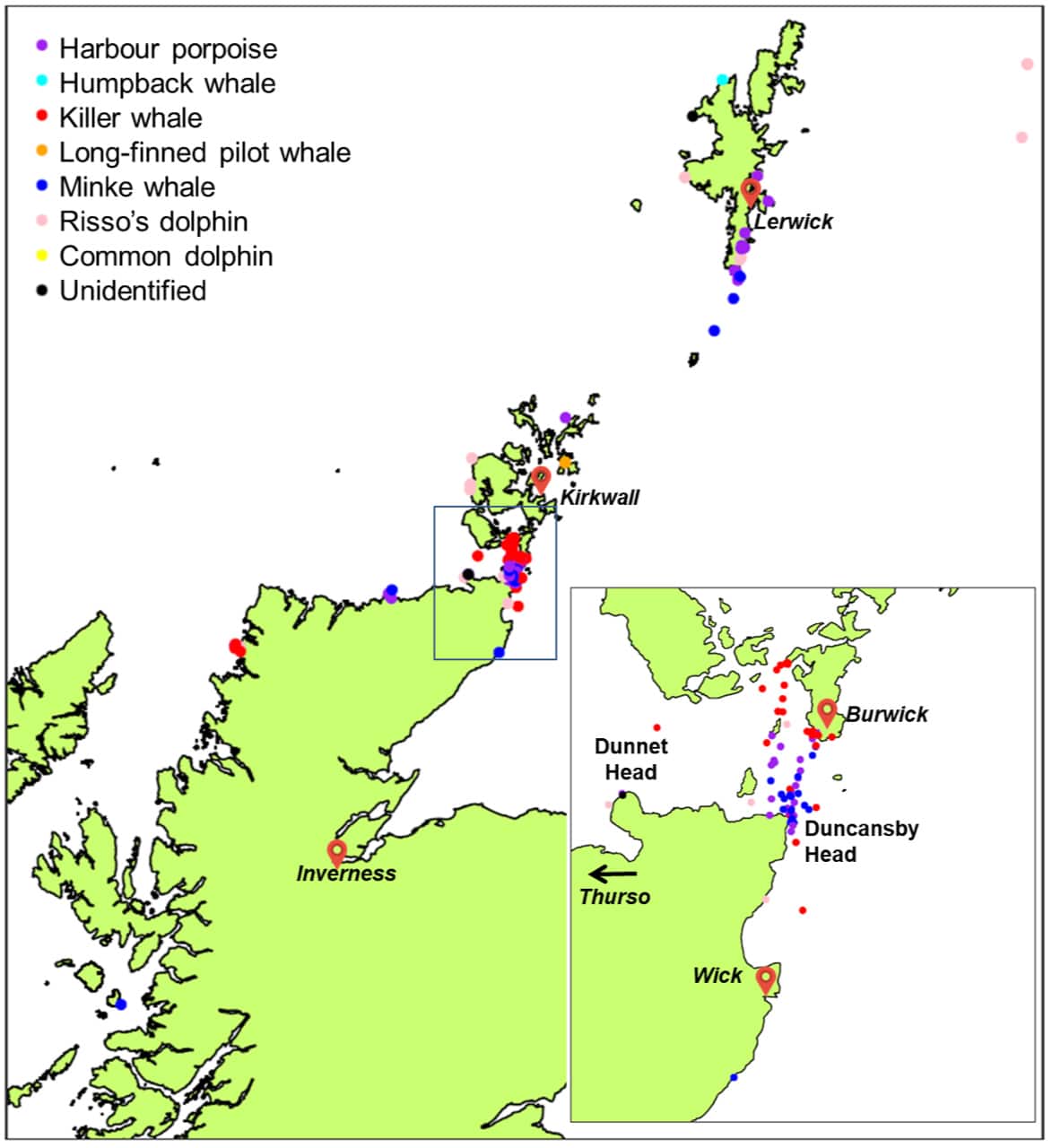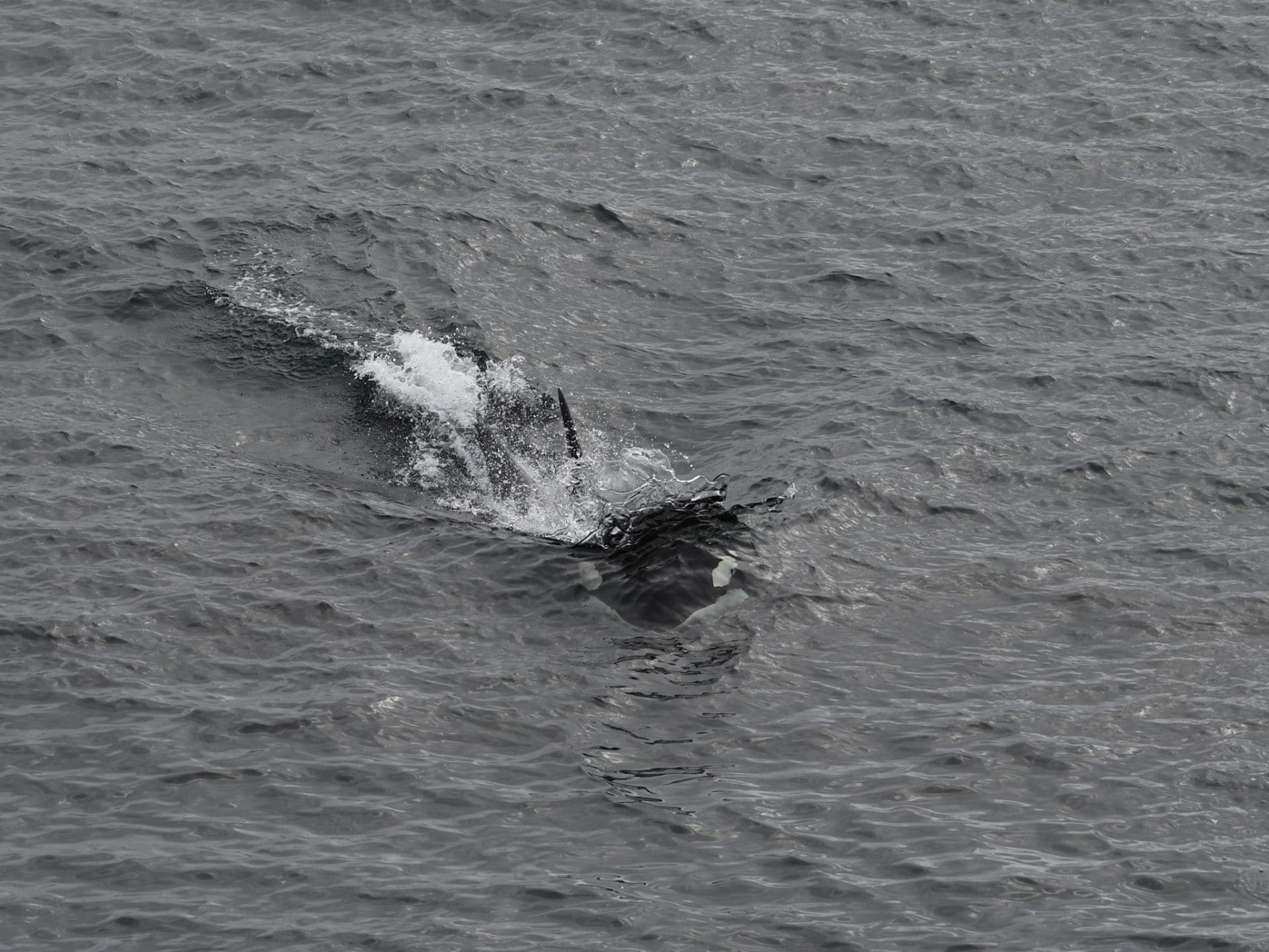News
Unprecedented effort to protect Orcas with citizen science: the 2019 Orca Watch event results are out!

![]() For ten days in late May, tourists, wildlife enthusiasts and local businesses around Caithness, Orkney and Shetland support Orca Watch, a citizen science project organized by the Sea Watch Foundation now in its 8th year, hoping to catch a glimpse of killer whales otherwise known as orcas, and any other species of cetacean (whale, dolphin and porpoise) visiting the waters of the Pentland Firth.
For ten days in late May, tourists, wildlife enthusiasts and local businesses around Caithness, Orkney and Shetland support Orca Watch, a citizen science project organized by the Sea Watch Foundation now in its 8th year, hoping to catch a glimpse of killer whales otherwise known as orcas, and any other species of cetacean (whale, dolphin and porpoise) visiting the waters of the Pentland Firth.
They stand endlessly from cliff tops and from the John O’Groats ferry decks, collecting sightings, behaviour, geographical positions and photographs of orcas and any other cetacean species which passes by.
The idea of organizing this event started with Colin Bird, Sea Watch’s long-standing Regional Coordinator for North-East Scotland, and was influenced by concerns over the possibility of underwater turbines installed in the Pentland Firth. This initiated the first seasonal watch in 2012 to gather information on how orcas use this area and what might be the consequences of such an installation.
“Without knowing how orcas or other cetaceans use the Pentland Firth, or which role they play in the ecosystem in the area, it is impossible for scientists and conservationists to know how to develop plans to protect them” says Dr Chiara Giulia Bertulli, Sightings Officer and lead organizer of this year’s Orca Watch event.
The Sea Watch Foundation in collaboration with eight other organizations (Whale and Dolphin Conservation, Scottish Natural Heritage, John O’Groats Ferries, Pulteneytown People’s Project, RSPB Orkney, Sanday Development Trust, High Life Highland Countryside Rangers, and the Hebridean Whale and Dolphin Trust) aims to change that with a research project that enlists the help of citizen scientists from all around Scotland and its offshore Isles.
During the 2019 Orca Watch, hundreds of volunteer observers spent almost 200 hours (100 more than in 2018) collecting 122 sightings of seven different cetacean species, stationed at 30 land watch sites (main site at Duncansby Head, Caithness) and aboard one vessel (operated by the John O’Groats Ferries) around Caithness, Orkney, and Shetland. Orca sightings were also sent in from the west coast of Scotland and the Hebrides.

LOCATIONS OF CETACEAN SIGHTINGS (N=122) COLLECTED DURING THE 2019 ORCA WATCH EVENT (MAY 17-26). COPYRIGHT: SEA WATCH FOUNDATION.
Species seen includes orca, Risso’s dolphin, humpback whale, harbour porpoise, short-beaked common dolphin, minke whale, long-finned pilot whale.
“This looks like being the best Orca Watch event of the last few years”, reported Dr Chiara Giulia Bertulli.
Harbour porpoises were the most commonly sighted species during Orca Watch. This species was recorded 46 times (38% of all records).
The Orcas were the second most commonly sighted species during Orca Watch, with 27 sightings (22%). Groups varied in size from a single individual to a group of 10 with an average group size of 3. Sightings were distributed around Orkney and Caithness, with few sightings also reported from Sutherland (Handa Island) and from the Outer Hebrides (Isle of Lewis). Orcas were first spotted on May 17st from Hoxa Head (Orkney) and on May 19th they were sighted off both Handa Island and Gary Beach, Isle of Lewis. On May 20th they were sighted from three different location around Orkney (Buwick, Hoxa Head, Lidell) and then in Caithness on May 21st during the morning ferry ride onboard the Pentland Venture (John O’Groats Ferries). After two days of bad weather and no further sightings morale seemed low. However at dusk on May 24th they were finally sighted at the Stacks of Duncansby and remained in the area through May 25th and 26th. Two known orcas were also sighted on May 26th from Burwick and Duncansby and from onboard the John O’Groats ferries. They are commonly referred to as “Hulk” and “Nótt”, which are orcas that are known to travel between Iceland and Scotland on foraging trips.
Minke whales were the third most abundant species recorded during Orca Watch, with 26 sightings being made, accounting for 21% of all records.
“Never in my wildest dreams did I imagine it would be that amazing! – spending the whole day watching them swimming off Hoxa Head as the light started to fade was something I am not going to forget easily” said Christina Worth, a Sea Watch Volunteer Observer, who sighted the orcas during her land-watch off Hoxa Head.
“Other interesting sightings from this year’s Orca Watch week included a humpback whale sighted off Nista Skerries, Uyea, a lone common dolphin encountered on May 21st off Gletness, Shetland, and many close encounters with minke whales sighted off Duncansby Head”, added Chiara.
“We are very pleased with the amount of information we have gathered during this year’s Orca Watch and our immense gratitude goes to our lead volunteer organizers from all of the groups (particularly Anna Jemmett, Lucy Baldwin, Steve Truluck, Rob Lott, Karen Hall, Emma Neave-Webb, Colin Bird, and Karen Munro), to all our network of volunteer observers, regional coordinators, to our partners and to all the local businesses that have pitched in, offered generous discounts and taken great care of all our Orca Watchers”, concluded Chiara.
For more information on the work of the Sea Watch Foundation visit their website by clicking here.
Gear News
Introducing the TR-80, IR-50 and CS-30 Regulators from DYNAMICNORD

Whether you are a beginner or a professional diver – with the three new main regulators from DYNAMICNORD, everyone will find their favourite regulator. They all look super stylish.
Excellent performance with the TR-80
Quality and performance are the be-all and end-all for regulators. It is not for nothing that the TR stands for Tec Reg. The innovative design of the TR-80 guarantees absolute reliability – even in ice-cold waters.

Perfect breathing effort at 0.8 J/l / certified for diving in waters below 10 degrees / structural design made of solid brass for best cold protection / membrane-compensated design with dry seal of the first stage / reduced exhalation effort thanks to optimized exhalation membrane and bubble deflector / adjustable Venturi (dive/predive) and adjustment knob for individual inhalation comfort / innovative design of the front cover prevents free-flow in strong currents or when diving with scooters / design made of sandblasted brass, matt chrome finish / 2 HP and 4 LP outlets / mouthpiece made of high-quality, anti-allergic silicone for maximum comfort.


Amazing underwater adventures with the IR-50
The IR-50 is the top regulator for advanced and experienced divers. Natural breathing is the essence of this regulator.

Ideal breathing effort at 0.8 J/l /certified for diving in waters below 10 degrees / compensated membrane / adjustable venturi (dive/predive) and adjustment knob for individual inhalation comfort/ outlet valve and deflector for minimum exhalation effort and reduction of bubbles on the face / design made of sandblasted brass, matt chrome finish / 2 HP and 4 NP outlets / mouthpiece made of high-quality, anti-allergic silicone for maximum comfort.


The Workhorse – our CS-30
For diving centres and diving beginners – the workhorse stands for strong construction, reliability and robustness. Perfect for your training.

Optimal breathing effort at 0.8 J/l /recommended for diving in waters above 10 degrees / non-compensated piston / adjustable venturi (dive/predive) / outlet valve and deflector for minimum exhalation effort and reduction of bubbles on the face / design made of sandblasted brass, matt chrome finish / 1 HP and 3 NP outlets / mouthpiece made of high-quality, anti-allergic silicone for maximum comfort.


Octopus OP-30
The OP-30 is the ideal addition to all DYNAMICNORD regulators. It is identical in construction to the CS-30.

The TR-80, IR-50, CS-30 (DIN & INT) regulators and the Octopus OP-30 are available from DYNAMICNORD dealers and in the online store.
DYNAMICNORD – Your Outdoor Companion.
Marine Life & Conservation
Paul Watson Released as Denmark Blocks Japan’s Extradition Bid

Renowned anti-whaling activist Paul Watson has been released from custody in Greenland after spending five months in detention. Denmark’s Justice Ministry rejected Japan’s request for his extradition, citing insufficient guarantees that his time already served in custody would be credited against any potential sentence.
The 74-year-old Canadian-American was arrested on July 21 in Nuuk, Greenland’s capital, when his ship docked to refuel. His arrest was based on a 2012 Japanese warrant related to a 2010 encounter in Antarctic waters. Japan alleged Watson obstructed operations and caused damage to a whaling research ship during efforts to disrupt illegal whaling. Watson has consistently denied these claims, maintaining his commitment to marine conservation.
Denmark, which oversees extradition matters for Greenland, concluded that while the legal conditions for extradition were met, the lack of assurances from Japan regarding time-served credit made extradition untenable.
In a video shared by his foundation, Watson expressed gratitude and relief, saying, “After five months, it’s good to be out… and good to know they’re not sending me to Japan.” He added that the most difficult part of his time in custody was being separated from his two young sons.
Watson is a pioneering figure in marine conservation, known for founding the Captain Paul Watson Foundation in 2022 after decades of activism with the Sea Shepherd Conservation Society. His bold efforts to defend marine life have earned him widespread support, including from celebrities and conservationists. His work has also been featured in the acclaimed reality TV series Whale Wars.
Watson’s lawyer, Jonas Christoffersen, praised the decision, stating, “We are happy and relieved that Paul Watson is now free.” He added that Watson is eager to reunite with his family and continue his vital work.
The arrest occurred while Watson’s vessel, the M/Y John Paul DeJoria, was en route to the North Pacific with a team of 26 volunteers to intercept a Japanese whaling ship. His foundation described the arrest as politically motivated and emphasized that Watson’s actions were focused on ending illegal whaling practices.
Japan resumed commercial whaling in 2019 after leaving the International Whaling Commission, asserting that whale meat is a cultural tradition. Conservationists, however, continue to challenge these practices, highlighting their impact on marine ecosystems.
Despite the challenges, Watson remains steadfast in his mission to protect marine life and bring attention to whaling practices. His dedication to ocean conservation has made him a globally respected advocate for the environment.
-

 News2 months ago
News2 months agoIconic SS United States to become the World’s Largest Artificial Reef
-

 News3 months ago
News3 months agoBook Review – 52 Assignments: Underwater Photography
-

 Gear News3 months ago
Gear News3 months agoDYNAMICNORD – New German diving brand enters the British market
-

 News3 months ago
News3 months agoExploring Cenote El Pit: A Diver’s Dream
-

 Gear News3 months ago
Gear News3 months agoTry BARE drysuits (and maybe even win one!) this Friday with Sea & Sea at North West Dive Fest
-

 Marine Life & Conservation3 months ago
Marine Life & Conservation3 months agoBook Review: Coral Triangle Cameos
-

 Blogs2 months ago
Blogs2 months agoDive the Egyptian Red Sea this Autumn with Regaldive
-

 News3 months ago
News3 months ago2024 Ocean Art Underwater Photo Competition Announced
















